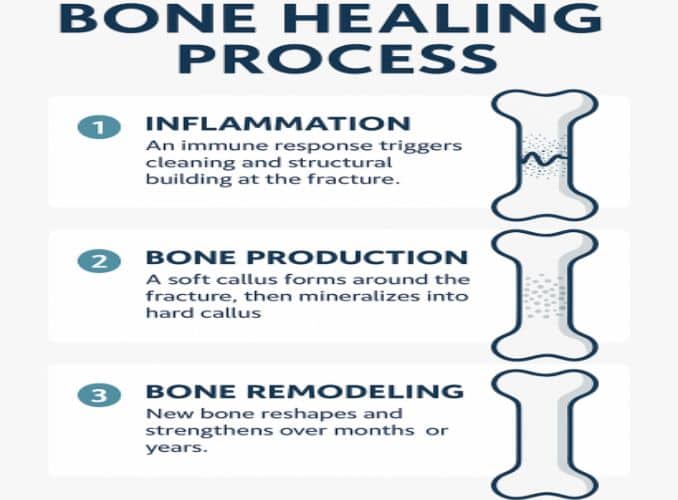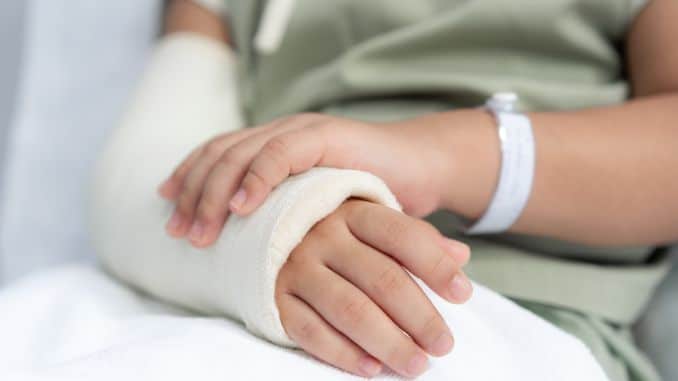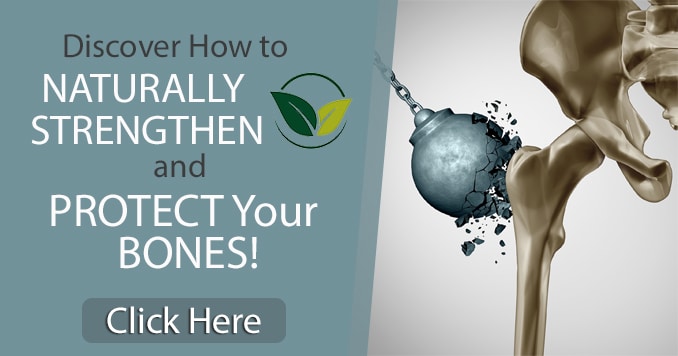About 1 million people in the U.S. experience a bone fracture [2] every year. While common, a broken bone can feel like anything but routine — limiting mobility, causing pain, and interrupting daily life.
Fracture healing time varies based on severity, location, age, and health, but typically ranges from 4 to 16 weeks. The good news? You can take proactive steps to promote healing and support the bone healing process — making your fractured bone heal stronger and faster.
That’s why many experts focus on how to make broken bones heal faster using evidence-based strategies.
How to Exercise Safely to Promote Healing?

Once your doctor recommends it, light and controlled movement can stimulate blood flow and trigger the release of healing factors in bone tissue. Here’s how to do it right:
1. Start with Non-Weight-Bearing Motion
Gentle range-of-motion movements (e.g., finger, wrist, ankle circles)
Focus on flexibility without stress
2. Advance to Partial Weight-Bearing (as advised)
Use assistive devices like crutches or a walker
Try water walking or light resistance in a pool
3. Integrate Weight-Bearing Activities

Walking, stair climbing, or light jogging
Dancing or low-impact aerobics
4. Add Strength Training
Resistance bands or light dumbbells
Focus on surrounding muscles [3] to support bone health
5. Include Balance and Stability Work
Yoga, tai chi, or simple balance drills help prevent future falls and promote healthy bones
Caution: Too much, too soon can delay healing. Always get clearance from your healthcare provider.
Understanding the Bone Healing Process

1. Inflammation Phase (Days 1–7)
Your body launches an immune response to the fracture, cleaning debris and building a structural base for new bone.
2. Bone Production Phase
A soft callus forms around the fracture, gradually mineralizing into hard callus — the early form of new bone.
3. Bone Remodeling Phase
Your body reshapes and strengthens the healing area over several months or even years, guided by use and body function.
What Slows Down Bone Healing?
Avoid these habits that sabotage faster bone healing:
- Rushing to move: Causes re-injury
- Smoking and alcohol: Impair blood flow and repair
- Too much caffeine or salt: Hinders calcium absorption
- Not asking for help: Leads to overexertion
Ways to Heal Bones Faster: Top Strategies
1. Eat These Foods for Strong, Healthy Bones

A well-balanced diet rich in essential nutrients makes a major difference.
- Leafy greens: kale, collard greens, bok choy
- Dairy products: cheese, cottage cheese, milk (almond milk as a non-dairy option) Lean proteins: meat, poultry, fish
- Fresh fruits & citrus fruits: oranges, kiwis, berries
- Green vegetables: broccoli, Brussels sprouts
- Whole grain breads
- Fatty fish: salmon, sardines
Include plenty of calcium, vitamin D, vitamin K, vitamin C, magnesium, and zinc to build more calcium-rich bone and promote healing.
2. Add Bone-Friendly Dietary Supplements

When food isn’t enough, try:
- Omega-3s (from fish oil)
- Vitamin D, B6, C, K
- Magnesium, boron, silicon
- Calcium (if you’re not getting enough from diet)
3. Manage Pain Without Delaying Healing

Avoid NSAIDs (like ibuprofen) that inhibit healing enzymes.
Try instead:
- Acetaminophen
- Turmeric, bromelain, garlic
- Vitamin C, Omega-3s
- Arnica cream
- Essential oils (helichrysum, cypress, fir)
4. Sleep More, Heal Better

Sleep is when your body repairs itself. Get 7–8 hours nightly and follow these tips:
- Elevate your injury
- Keep pets off the bed
- Create a cool, dark sleep space
- Drink calming teas (e.g., chamomile, lemon balm)
Nutrition is one of the most overlooked factors in fracture recovery. We always think about casts and surgeries, but forget how important vitamins and minerals are. Calcium, Vitamin D, and especially protein intake can dramatically impact the pace and quality of bone repair.” — Dr. Susan Bukata, Chief of Orthopaedic Surgery at UC San Diego Health (Source: American Academy of Orthopaedic Surgeons [AAOS])
Final Thoughts
Whether you’re healing from a fractured bone, broken arm, or bone injury caused by accident or age-related weakness, these natural, science-backed strategies help your body absorb the right nutrients [1] and boost fracture healing effectively.
Don’t forget to check out our 14-Day Bone Strengthening Quick Start Program for deeper guidance on how to build stronger bones — now and for life! If you’re wondering how to make broken bones heal faster, start by optimizing your nutrition, movement, and sleep.
FAQ
1. What helps bones heal faster after a fracture?
A combination of adequate rest, nutrient-rich foods (especially those high in calcium, vitamin D, and protein), safe physical activity, and avoiding smoking or excess alcohol can significantly accelerate the healing process.
2. How long does it take for a broken bone to heal completely?
Most broken bones heal in 6 to 12 weeks, depending on the severity, location, and your overall health. However, bone remodeling can continue for months to a year after the break.
3. Does vitamin D really help with bone healing?
Yes — vitamin D enhances calcium absorption, supports bone tissue regeneration, and works with vitamin K and magnesium to rebuild strong, dense new bone.
4. Can certain foods delay bone healing?
Yes. Foods high in salt, sugar, and caffeine, as well as sweetened beverages, may hinder your body’s ability to absorb calcium and other minerals. Avoid processed foods during the healing period.
5. Is it okay to exercise with a broken bone?
Light, guided movement can support healing, but you must follow your doctor’s advice. Overdoing it early can re-fracture the bone. Weight-bearing exercise, once cleared, helps rebuild bone strength and density.


